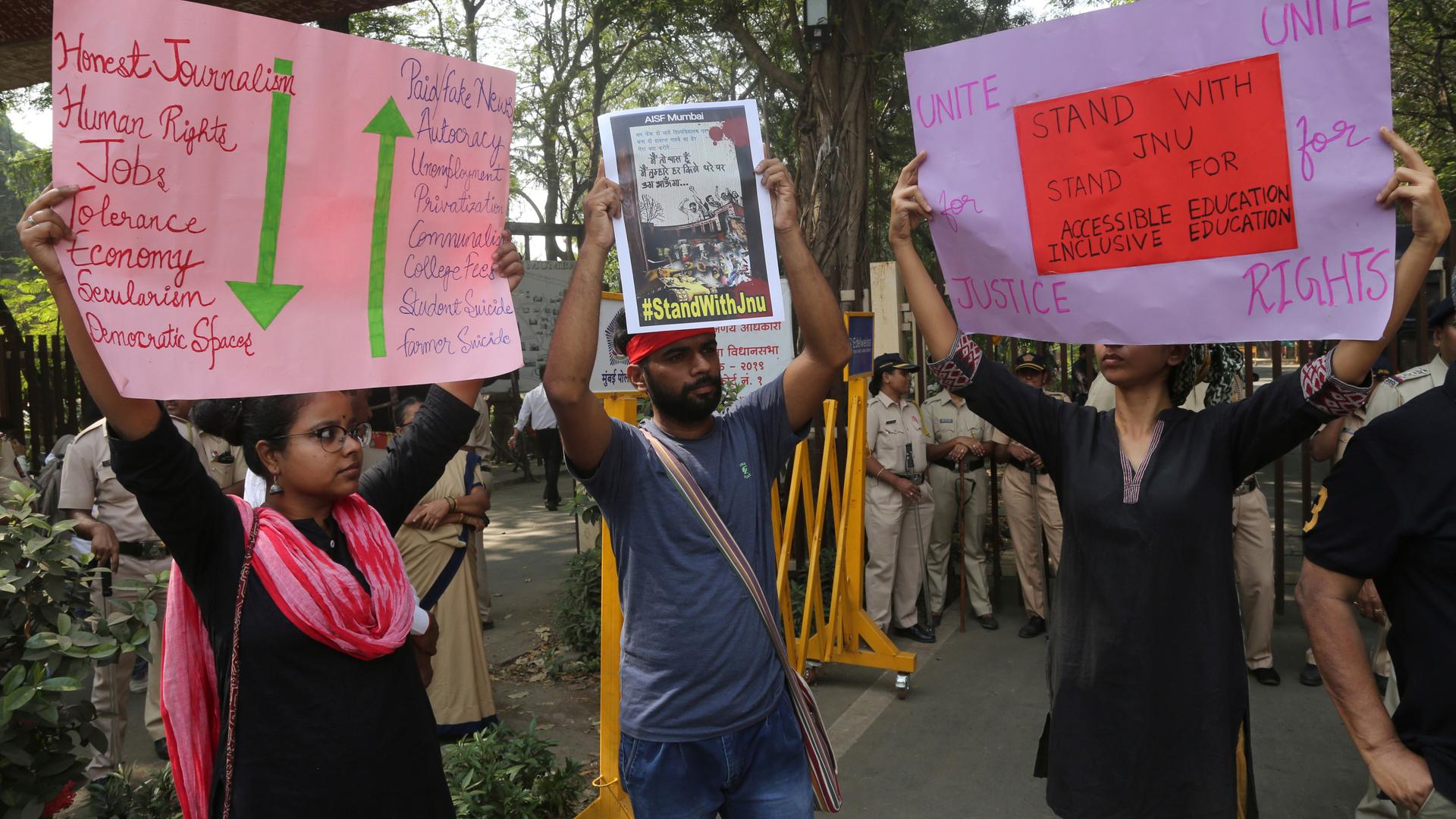What started as a protest against a rise in fees has turned into a larger fight to maintain institutional independence at a prestigious Indian university.
When thousands of student protestors from Jawaharlal Nehru University (JNU) tried to march from their campus to the parliament in New Delhi on November 18, they were brutally baton-charged by Delhi Police.
More than 800 police and ten companies of the Central Armed Police Forces (CAPF) were deployed in and outside the campus, barricading the premises, eventually leading to the arrest of 100 students for ‘aggressive defiance’.
For students who were protesting the unprecedented 300 percent hostel fee-hike for the past three weeks, the police deployment and assault transformed their struggle beyond just a dispute over rising fees.
Since its inception in 1969, JNU has stood as a beacon of hope for higher education and research in India. Not only did it create an empowering space for students to debate controversial political issues, but it also liberated them from the oppression of casteism, communalism and exorbitant fees.
But the intellectual, often left-leaning, discourse produced within JNU has now become a challenge to the growing hyper-nationalist, anxiety-ridden and neo-liberal discourse mushrooming in India at an alarming rate.
This is exactly why the JNU student’s protest has now snowballed into not just a ‘face-wash’ with the university administration but towards the larger question of the government’s apathy towards education, misrepresentation by the media and the glaring socio-economic disparities within the country.
The authoritarian snatching of the democratic right of students to protest is being termed as ‘Modi’s Emergency in India’ by opposition leaders like Sitaram Yechury, from the Communist Party of India (Marxist).
After all, no one was spared. Even visually-impaired students like Sashi Bhushan Pandey were mercilessly beaten by the police, later leading to him being admitted at the Trauma Centre of All India Institute of Medical Sciences.
The growing paranoia surrounding JNU, which reduces it to a mere hotbed of ‘communist ideologies’ against India stems from political dementia and inaccurate historical interpretations.
After all, JNU has produced dignitaries like Abhijit Banerjee (Nobel Prize-winning Indian-American economist), Nirmala Sitharaman (India’s Minister of Finance) and Subrahmanyam Jaishankar (India’s Minister of External Affairs) among many others. Today it is fighting the for the right to remain free, uncensored and affordable for thousands of students who hail from the most remote parts of India.
Since coming to power in 2014, the ruling Bhartiya Janta Party (BJP) has introduced measures to ‘fix’ and perhaps decimate the critical, left-leaning culture of JNU. It started in 2016 when the government appointed M Jagadesh Kumar as JNU’s Vice-Chancellor (VC).
Kumar is accused of being associated with a wing of the Rashtriya Swayamsevak Sangh (RSS), the parent organisation of BJP. Kumar denies the allegations, but his poorly-measured policy interventions seem to reveal the opposite.
In February 2016, three students of JNU were arrested for sedition, accused of chanting ‘anti-India’ slogans while protesting against the capital punishment charge given to Afzal Guru, the Kashmiri ‘terrorist’ involved in the 2001 attack on the Indian Parliament. The chants also included support for Kashmir’s right to self-determination.
The sedition law was enacted in 1870 by the British Raj to contain political dissent emerging from India’s burgeoning independence movement. One has to ask then why this draconian colonial legacy endures and is being weaponised in a democracy against its students?
It was the first time since an emergency was imposed by the late Prime Minister Indira Gandhi (1975-77) that police (in civilian uniforms) entered the campus and ransacked hostels, searching for students.
Doctored videos circulated on social media and television channels in India, framing JNU students as ‘anti-national’ went viral.
Later, investigations revealed that the real culprits were outsiders and no concrete evidence was found linking the three arrested students with the event, and they were granted bail.
But the damage was done.
In an instant, a reductive binary was established to pit JNU as a target of the growing ultra-nationalistic discourse in India.
The heavily subsidised education in JNU was vehemently attacked by Indian tax-payers, who believed that funding universities like JNU were a mishandling of their hard-earned money.
I will now recount some of the major incidents at JNU since the Modi government came to power that shows attempts to push it in line with the BJP’s worldview.
In 2017, Vice-Chancellor Kumar requested General VK Singh, the Minister of State for External Affairs to procure an army think tank within the university. He intended to remind the students about the sacrifices made by the Indian Armed Forces, especially India’s victory in the Kargil War against Pakistan in 1999. It was immediately criticised for being antithetical to the non-violent discourse of India’s Freedom Movement.
In 2018, the JNU Administration appointed US-based author Rajiv Malhotra as an Honorary Professor at its Centre for Media Studies. Widely seen as a Hindutva ideologue, Malhotra’s appointment was heavily criticised and termed as the ‘last nail in the coffin of higher education in India.’
In September 2019, the VC demanded the resume of 87-year-old Professor Romila Thapar, to ‘review’ her position as Professor Emerita. Thapar, who is one of India’s leading historians, has been writing against the attempt to replace India’s history with Hindu-nationalist ideology. She declined to submit her CV and was supported en masse by activists, students, journalists, and opposition politicians.
In a nutshell, the consistent attempt by the BJP to dehumanise the students and faculty of JNU is not a new phenomenon. The students who are protesting right now are fully aware of the damaging consequences and the fight that remains.
Meanwhile, until the draconian and dehumanising policies are removed, the students will continue their struggle to maintain the independence of one of India’s top universities.
Author: Shubhda Chaudhary
Shubhda Chaudhary is a freelance journalist and academic based in New Delhi, India.
Source










Discussion about this post